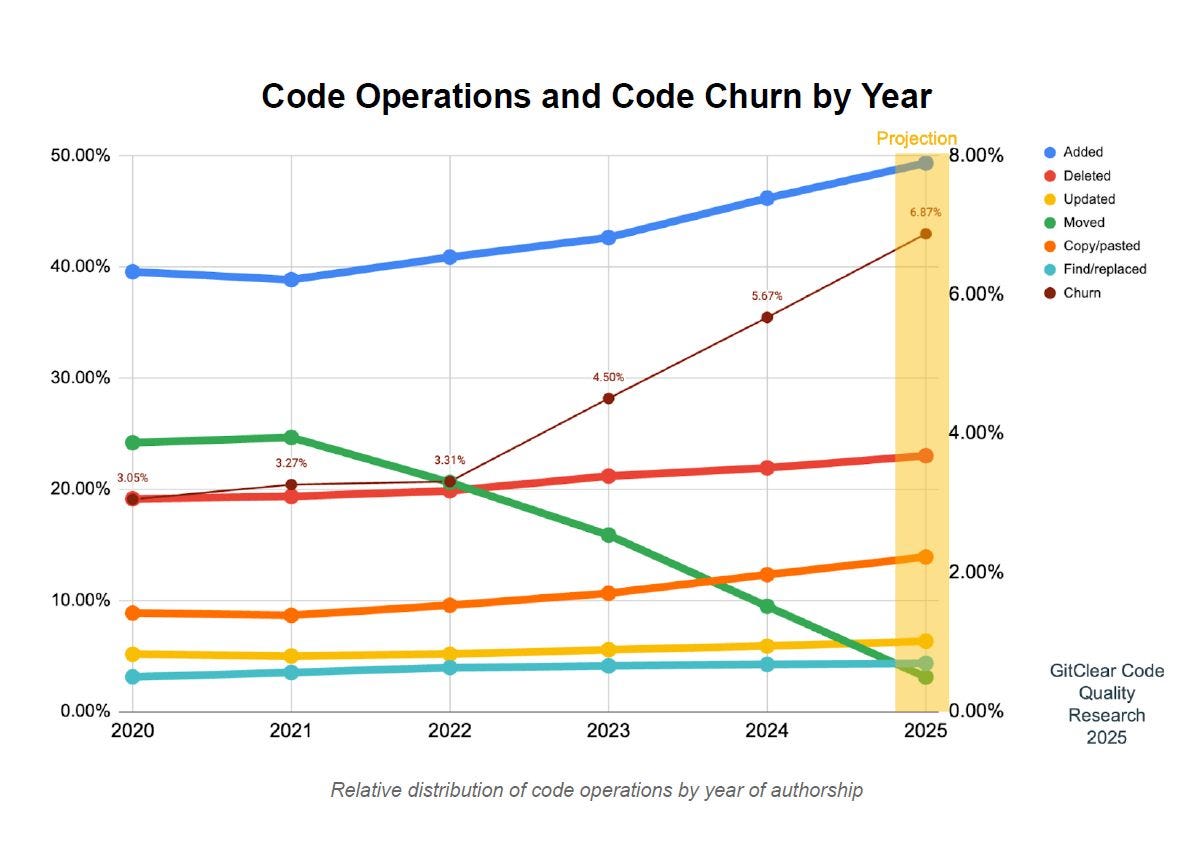The Trends #7: TypeScript is getting 10x faster!
and how AI tools impact your productivity and critical thinking skills.
In today’s issue, we cover:
The Typescript compiler has been rewritten in Go. Microsoft's surprising language choice has developers talking, and build times are dropping dramatically. We will see why Anders Hejlsberg and the team chose Go over C#.
The State of Developer Ecosystem 2024 by JetBrains. Interesting insights from JetBrains' survey that might challenge what you thought about language adoption and AI's role in our daily work.
AI Tools improve productivity but degrade code quality. This is the inconvenient truth about AI coding assistants that nobody wants to admit. GitClear's analysis reveals a troubling trade-off we need to address.
Using Generative AI can damage your critical thinking skills. Microsoft and Carnegie Mellon's reminder that our cognitive muscles need exercise, too, is timely. I've been thinking about this one a lot lately.
What skills will still be relevant in 2030? The World Economic Forum's latest report offers hope that continuous learning pays off. I'll share which skills are becoming more important and how we can adapt.
So, let’s dive in.
WeAreDevelopers World Congress is back — July 9–11, 2025, in Berlin (Sponsored)
Join 15,000+ developers and 500+ speakers from GitHub, Microsoft, Intel, Oracle, Mercedes-Benz, and more for talks, hands-on workshops, and deep-dive masterclasses.
This is the event where the global dev community shows up.
🎟️ Use code WWC25_WithMilan for 10% off your Congress Pass.
Typescript compiler rewritten in Go
Microsoft recently decided to port TypeScript in Go, and the early results are interesting:
10x faster builds – VS Code compilation drops from 77.8s → 7.5s
8x faster editor load times – VS Code project load time cut from 9.6s → 1.2s
50% less memory usage
This means instant feedback, faster refactorings, and better AI-powered coding.
Over time, the native TypeScript 7.0 (codename: Corsa) will replace the JS-based TypeScript 6.0, bringing massive performance gains. Both versions will coexist now, but the future is clear: TypeScript is going native.
The preview is expected in mid-2025, and the full release is expected by the end of the year. This could be a game-changer for large projects and developer tooling.
Of course, many of us from Microsoft World would ask, why Go, why not C#? And here is the comment by Anders Hejlsberg on the choice of languages for TypeScript on GitHub. They tried different options and then selected Go, which boils down to the following: Go is the lowest-level language with a garbage collection and more functions. At the same time, C# is mostly OOP-related (the TypeScript compiler almost does not use any classes).
👉 Learn more about the approach here.
The State of Developer Ecosystem 2024
JetBrains recently surveyed 24,000 developers worldwide about the main insights into their work, tools, and more.
Here are key takeaways:
Programming languages adoption
JavaScript remains the most widely used programming language (70%), but TypeScript continues its impressive growth trajectory, reaching 35% adoption compared to just 12% in 2017. This trend reflects the industry's increasing emphasis on type safety and maintainability.
The newly introduced "JetBrains Language Promise Index" identifies TypeScript, Rust, and Python as the languages with the brightest futures, based on consistent growth patterns and developer adoption intentions. Rust's steady rise is particularly noteworthy as it aspires to replace C++ with its focus on memory safety and ownership mechanisms.
Python, now used by over half of programmers worldwide, dominates AI and machine learning applications. Surprisingly, many C++ developers are also actively involved in AI/ML projects.
Developers working with Scala, Go, Kotlin, and Rust top the earnings charts, followed by C++, Shell, Java, and Python.
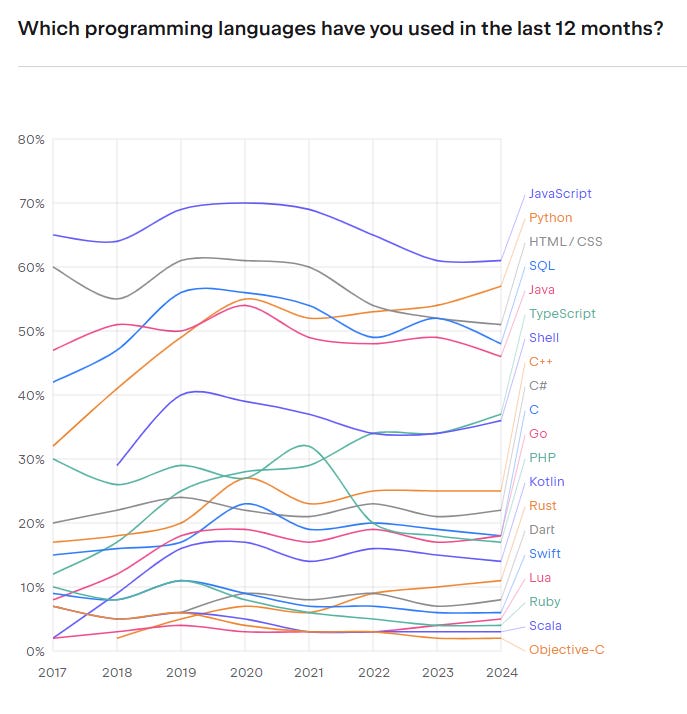
The AI impact in software development
The fear of AI appears to be diminishing throughout the industry:
69% of developers have tried ChatGPT for coding, with 49% using it regularly
40% have experimented with GitHub Copilot, and 26% use it as part of their regular workflow
Nearly 80% of companies either allow third-party AI tools or have no established policy against them
Only 11% of organizations prohibit entirely cloud-based AI tools
Developers report significant benefits from AI assistance. For example, 67% spend less time searching for information, and 58% experience faster coding and development. On average, most developers save 1-4 hours weekly by leveraging AI tools.
Perhaps most interesting is that 18% of developers are now integrating AI into their products, indicating AI's steady infiltration into mainstream software.
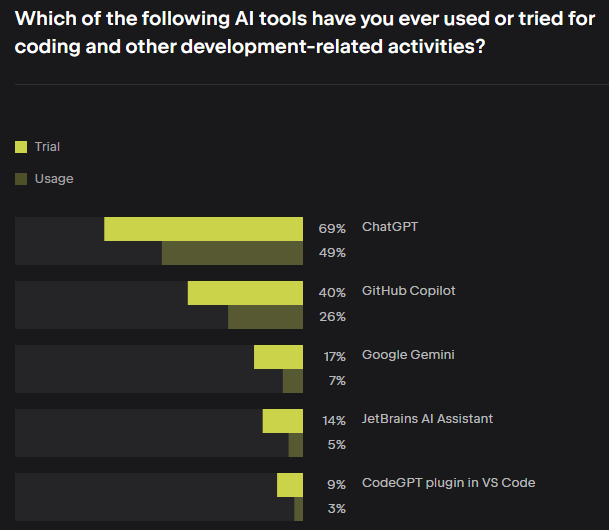
Developer experience and workplace trends
The report highlights the growing importance of Developer Experience (DevEx or DX) in the industry. Almost half of tech managers reported that their companies measure developer productivity, DX, or both. Both technical and non-technical factors play nearly equal roles in shaping developer experience.
Communication remains the developers' most significant challenge. Understanding user requirements (38%), communicating with other job roles (34%), and understanding others' code (32%) top the list of difficulties far outweighing purely technical challenges.
Despite recent tech industry layoffs, most developers feel secure in their positions. Only 16% reported losing their job due to layoffs in the past two years, though 30% felt indirect effects. The job market presents a mixed picture, with 30% reporting a favorable job market versus 46% finding it challenging to secure new positions.
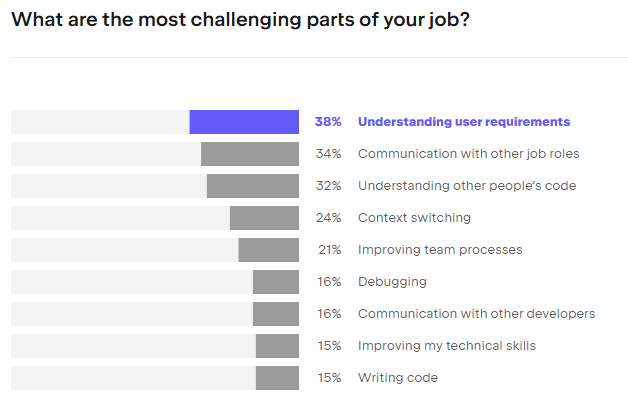
Surprising platform insights
Contrary to popular belief, desktop application development (38%) surpasses mobile development (32%), challenging the notion that mobile has overtaken desktop. Browser-based applications remain most common at 62%.
Despite significant media attention, Blockchain is targeted by only 3% of developers, indicating relatively low traction among mainstream software professionals.
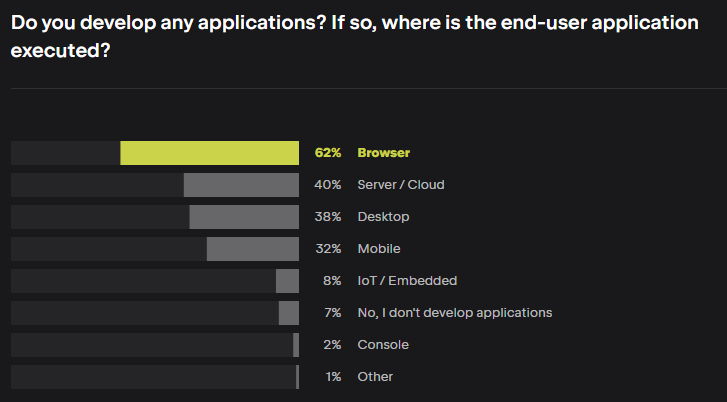
Diversity and demographics
The industry faces significant gender diversity challenges. Women comprise just 6% of the tech workforce (up 1% from previous years). This percentage varies significantly by region, with South Korea and Argentina leading in women's representation.
Interestingly, regions with higher female representation appear to have more positive work environments, suggesting a correlation between diversity and workplace culture.
The software development industry remains relatively young. Developers aged 18-29 comprise 40-50% of the workforce in most countries, with even higher percentages in India, the Middle East, Africa, and Central Asia.
AI Tools improve productivity but degrade code quality
GitClear’s latest analysis of 211 million lines of code found that AI assists (like Copilot) can boost productivity but worsen code quality. It shows a sharp trade-off: We crank out more code, yet our codebases have far more duplication and less refactoring.
Here’s the main takeaway from the report:
🔁 8x more duplicated code blocks in 2024. Copy/pasted snippets soared because pressing “Tab” to generate new code is more straightforward than reusing existing modules – but the AI might not realize a similar function already exists elsewhere in the codebase.
📉 40% less refactoring. This suggests we’re adding code faster than improving what’s already there.
🪟 Limited context window. AI tools only “see” part of your repo, so they’re more likely to duplicate code than reuse or consolidate what exists. Human developers retain the critical advantage of knowing the codebase. They know when a function can be reused or if an abstraction could reduce complexity.
Refactoring is still a human edge—merging functions, removing duplication, and keeping the codebase DRY. It’s extra work now but pays off later with fewer bugs and more straightforward maintenance.
We can leverage AI to generate boilerplate and accelerate development. Still, to keep our systems clean and maintainable in the long run, we must pair them with human-driven refactoring and design.
Here are a few strategies to keep in mind:
Reexamine metrics: Lines of code added can be misleading if they add bloat and repetitive logic.
Integrate refactoring: Make code consolidation and cleanup part of each sprint.
Automate checks: Tools that highlight duplicate blocks or track refactoring progress (SonarQube, GitClear, IDEs, etc.) can prevent bloat.
Using Generative AI can damage your critical thinking skills
A recent Microsoft and Carnegie Mellon University study found that increased reliance on GenAI leads to decreased critical thinking. The study examined 319 knowledge workers and discovered that increased faith in AI is associated with less critical analysis, appraisal, and reasoned judgment. This is problematic because they’re hard to regain once these essential cognitive functions weaken from infrequent use.
What we can learn from this? As AI gets better and more reliable, people might give up their deep thinking abilities for convenience. In other words, AI has a hidden cost: It could lead workers to lose muscle memory for more routine tasks.
How can this issue be solved? Designing tools that prompt us to question, verify, and refine AI outputs can keep critical thinking alive in an AI-driven world. People have not been educated on how to use AI ethically, responsibly, and efficiently.
👉 Check the full article.
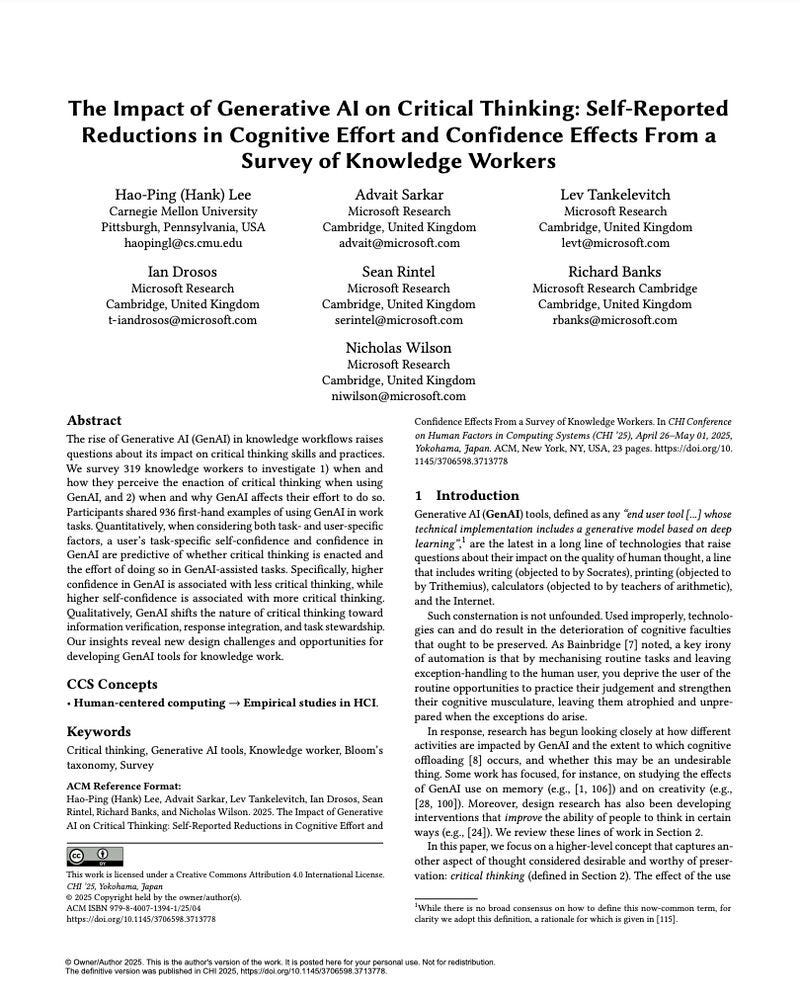
What skills will still be relevant in 2030?
Employers worldwide expect 39% of today’s core skills to change by 2030, according to the World Economic Forum’s Future of Jobs Report 2025.
This might sound big, but it’s down from 44% in 2023, a sign that continuous learning and reskilling efforts are helping companies stay ahead of emerging skill gaps.
The skills on the rise:
AI, Big data, and tech - Technology-related capabilities will outpace all others over the next five years. AI, machine learning, big data, and cybersecurity stand out. You don’t have to be a coding genius, but basic tech literacy is increasingly vital.
Creative thinking - While AI handles routine tasks, creativity remains a human strength. Employers want new ideas and fresh perspectives.
Resilience, flexibility, and agility—Business and economic changes are fast. Teams need people who can adjust quickly and easily recover from setbacks.
Curiosity and lifelong learning—As skills evolve quickly, curiosity and a commitment to learning keep you relevant. Adapting to new tools is essential for remaining employable.
Leadership and social influence - Leading teams, motivating colleagues, and building strong relationships matter in every field.
Talent management - Companies need people who can spot potential and develop others. Recruiting, mentoring, and retaining talent are big priorities.
Analytical thinking - Data is everywhere. Employers seek people who can interpret data effectively and make data-driven decisions.
Technological Literacy - Basic tech proficiency is a baseline for all roles, from automation to cloud computing.
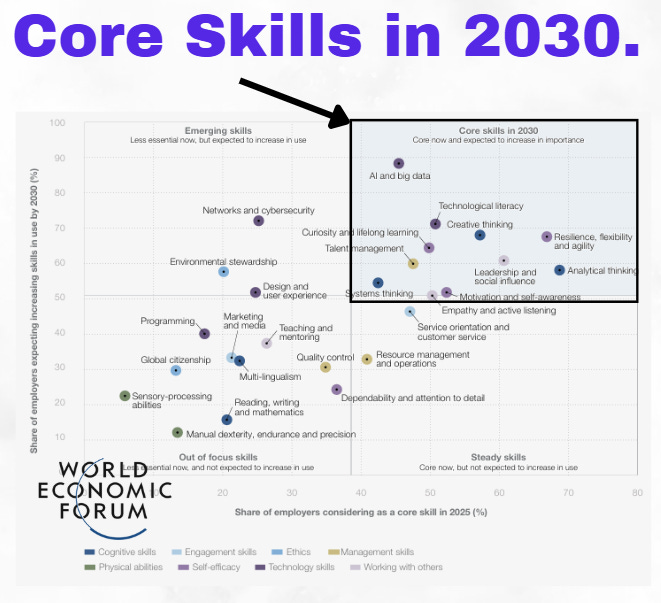
What can we do to adapt?
✅ Upskilling and reskilling: More companies now invest in targeted training to keep employees’ skills up to date.
✅ Balanced skill sets: An ideal candidate combines technical know-how—like AI or cybersecurity—with solid communication and leadership skills.
We live in an era where entire sectors can change overnight. A combination of human and technical skills distinguishes high performers.
If you stay curious, embrace continuous learning, and refine your collaboration ability, you’ll be equipped for the future—even if it arrives faster than we expect.
👉 Check the full report.
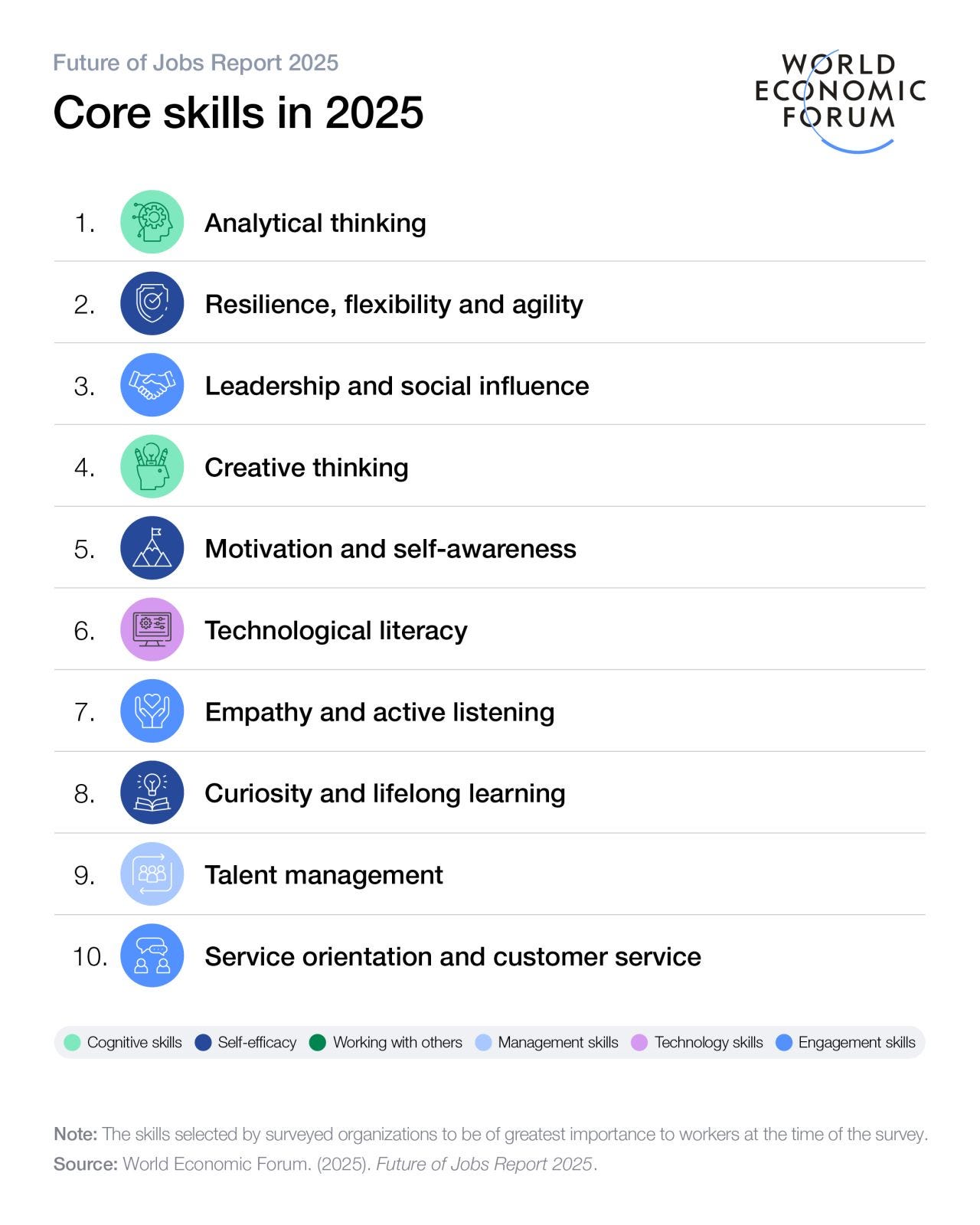
👉 Join me on Software Architecture Superstream: Communicating Software Architecture by O’Reilly
I am honored to present at the O’Reilly event on communication software architectures, where Neal Ford, Simon Wardley, Jacqui Read, and others will join me.
The event will happen on April 29 (5-9 pm CET).
👉 Sign up here.
More ways I can help you
📢 LinkedIn Content Creator Masterclass. In this masterclass, I share my strategies for growing your influence on LinkedIn in the Tech space. You'll learn how to define your target audience, master the LinkedIn algorithm, create impactful content using my writing system, and create a content strategy that drives impressive results.
📄 Resume Reality Check. I can now offer you a service where I’ll review your CV and LinkedIn profile, providing instant, honest feedback from a CTO’s perspective. You’ll discover what stands out, what needs improvement, and how recruiters and engineering managers view your resume at first glance.
💡 Join my Patreon community: Be first to know what I do! This is your way of supporting me, saying “thanks," and getting more benefits. You will get exclusive benefits, including 📚 all of my books and templates on Design Patterns, Setting priorities, and more, worth $100, early access to my content, insider news, helpful resources and tools, priority support, and the possibility to influence my work.
🚀 1:1 Coaching: Book a working session with me. I offer 1:1 coaching for personal, organizational, and team growth topics. I help you become a high-performing leader and engineer.






